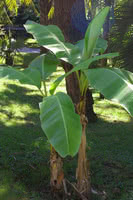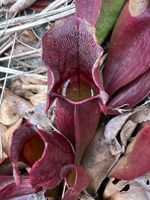Mon-Fri 9am - 5pm Mountain time
Hardy Banana vs Purple Pitcher Plant
Musa basjoo
Sarracenia purpurea
CUSTOM GROW
CUSTOM GROW
The Hardy Banana is a fast-growing evergreen perennial that dies down to the ground each year. A stunning tropical-looking accent for your yard and patio, the Japanese Fiber Banana can be overwintered outdoors in several northern U.S. states and southern Canadian regions. In northern regions, you can bring this plant inside and leave it in your garage. If you enjoy Mexican cuisine, you can use the leaves to make tamales.
Purple Pitcher Plant is a native carnivorous plant, easily recognized by its purple-tinged, tubular pitchers that capture and digest insects. The nectar along the rim attracts insects to the pitcher, where slippery surfaces and downward-pointing hairs cause them to fall into the fluid below. Once inside, they are broken down, providing nutrients that allow the plant to thrive in nutrient-poor soils.
The plant produces nodding, purple-red flowers held high above the leaves. Interestingly, these blooms are pollinated by the Pitcher Plant Fly (Fletcherimyia fletcheri), whose larvae live in the fluid of the pitchers and feed on some of the trapped insects. It can be found in bogs, fens, and other wetlands. It is well-suited for wetland gardens, restoration, and naturalisation projects.
The Purple Pitcher Plant can be challenging to grow because of its specific requirements. It thrives in consistently moist (but not waterlogged), acidic soil, with a peat-and-sand mix typically recommended. The plant is sensitive to fertilizers, dissolved salts, and chlorinated water. When given the right conditions, full sun will bring out its brightest colors.
The Purple Pitcher Plant is the provincial flower of Newfoundland & Labrador.

